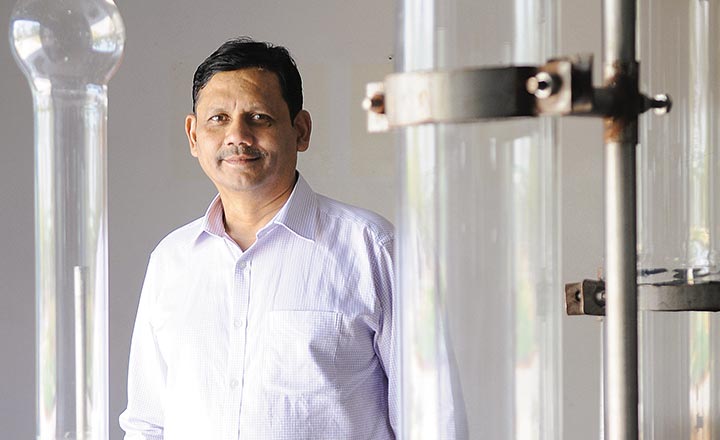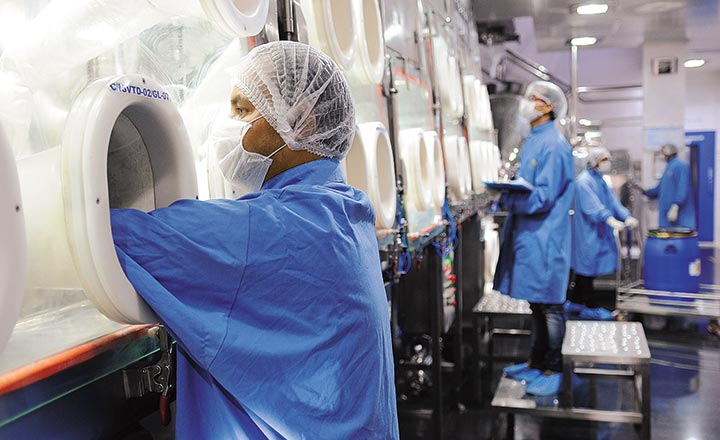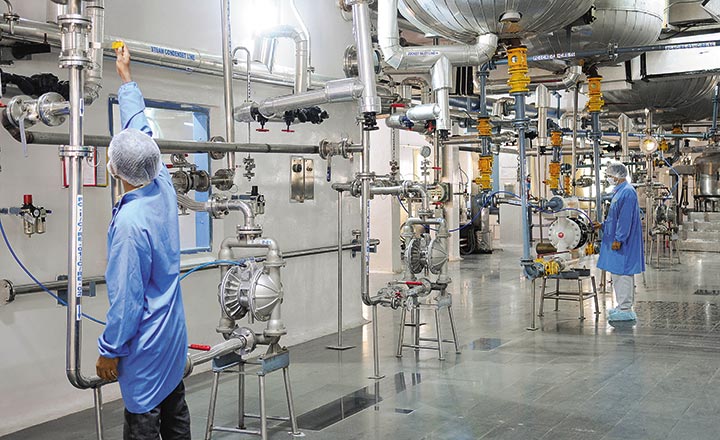An Rs.800 crore success story woven out of a small town like Raichur — this was the vision of a first generation entrepreneur, Vishnukant Bhutada, managing director of drug manufacturer Shilpa Medicare. 30 years of being in business, Shilpa is among the leading suppliers of oncology APIs in the world with eight manufacturing plants and three R&D centres. When most pharma companies rushed to the US, the biggest pharma market, Bhutada took a different route choosing the rest of the world to establish its global footprint. After firmly establishing itself in Europe, Japan and other markets, the company made its foray into the US last year. While Europe forms the largest chunk of Shilpa Medicare’s revenues, its recent entry into the US markets is all set to push the company into a higher growth trajectory
The 30-year-old Shilpa Medicare’s shiny new corporate office in Raichur is less than a year old. With a population of 2.3 lakh, Raichur is known for its flourishing agricultural trade and gold mines. It is this town of Raichur that helped Vishnukant Bhutada build a business worth over Rs.5,000 crore.
Although, Hyderabad, the nearest metro city from Raichur, is less than 200 km away he happily stuck to Raichur, his hometown. “I wanted to develop the region where I grew up,” he says.
Shilpa Medicare, which manufactures active pharmaceutical ingredients — API (used to make formulations) and formulations (the process that leads to the final medicinal product) across three major segments — oncology API, non-oncology API and custom synthesis. With a strong position in the oncology segment, the company has developed around 54 APIs and an almost equal number of formulations, 80% of which are oncology related. So far, the company has filed around 175 patents. Shilpa Medicare supplies to leading global players in regulated markets such as Europe and Japan. The company is now all set to make its foray into the US, which promises to kick off its next leg of growth.
Medicine man
Born into a family that was traditionally engaged in cotton trading, Bhutada, as a young B Pharm graduate, wanted to break away from tradition. About three things he was clear: he wanted to make use of his degree, he wanted to do it differently, and he wanted to do it in his hometown.
With support from his family, at 22, Bhutada started Shilpa Medicare in 1987, right after his graduation. With an initial investment of Rs.50 lakh and a team of 20, Bhutada began manufacturing antibiotics. During the initial years of the company, they had to struggle. Since the head office was located in a remote town in Karnataka, it was a major challenge to acquire and retain talent. But Bhutada was determined to prove that a successful business venture could be born in places other than the metros. When commercial production began, within two years the company was able to clock a turnover of Rs.10 lakh.

Bhutada soon realised that his firm will not survive if it stuck to manufacturing antibiotics alone. He had to find newer markets and niche segments where the firm could differentiate itself from others. But expanding the business came with its own set of challenges. Bhutada’s plans needed additional capital and the family funds were not enough. So in 1994, the company went for an IPO of Rs.400 crore.
Around the same time, Shilpa Medicare also ventured into exports. Bangladesh was the first market it entered. “Nobody was focusing on Bangladesh back then. But when I visited the place, I saw that there was a huge demand, so I went for it anyway.” Most pharma companies focus their attention on the US since it is the largest market. But Bhutada opted for a different strategy. He decided to leave the US and target the rest of the world, including South East Asia, Asia Pacific, Africa and the Middle East.
Around 2000, the company decided to focus on oncology by investing Rs.4 crore in building its first oncology block. “Unfortunately, cancer is the fastest growing disease today. We could see well ahead how it was going to be a problem for a country like India, which would need affordable medicines, because oncology drugs are too costly. So we decided to invest in this segment,” Bhutada says. The patent expiry of Gemcitabine (a chemotherapy drug used to treat pancreatic, ovarian and breast cancer) in 2009 in key European markets gave the company the much needed boost to grow its oncology API business and they have never looked back since. The company presently gets 80% of its revenue from Europe.
Around 40% of its revenue comes from oncology; custom synthesis brings in another 40%, while the balance comes from the non-oncology segment. According to IMS Health, the global oncology market size is likely to cross $100 billion by 2018 from $65 billion in 2013. Given the complexity in manufacturing, high capital investment and strict regulatory controls, there is limited competition in oncology, making it a lucrative segment to be in.

Ajeet Singh Karan, partner at Baring Private Equity Partners India and non-executive independent director at Shilpa Medicare says Bhutada has an uncanny ability to spot future growth opportunities early. Well-established in the oncology segment by now, the company is looking into other segments like new drug delivery systems, biologicals, nanoparticle research and disintegrating strips, “to keep the momentum” going as Bhutada puts it. For instance, Shilpa Medicare is the first company to introduce film formulation technology in India. The technology looks at developing fast dissolving oral films that as Bhutada explains, dissolves as soon as the drug touches the tongue and gets absorbed into the bloodstream immediately. The technology helps cure illnesses that require immediate relief like migraine, allergies, etc. and avoids the need to go to hospital or opt for intravenous therapy.
Baring Private Equity Partners first invested in the company in 2010 when it subscribed to shares worth Rs.70 crore. It currently owns 7% of the company. Tano Capital invested around Rs.9 crore in early 2006 and exited after making a handsome 4.5x return. The private equity investor invested in the company again in 2014 from its second fund and currently holds a 9% stake. In December 2016, US-based private equity firm TA Associates picked up 3.7% stake for approximately Rs.175 crore.
It is easy to see why private equity investors can’t seem to get enough of the company. Karan notes that the company is able to take these risks given the fact that it is operationally very strong with very low working capital and negligible debt.
He also believes that one of the biggest strengths of the company is that it has vertically integrated into APIs. This allows it to use its own APIs in its formulations, giving it total control over quality.
Starting off from a single location in Raichur, the company now has four plants in the town, one in Vizag, a formulation plant near Hyderabad, a film facility in Hyderabad and Bengaluru and an API plant and a formulation division in Vienna. It has one of the largest oncology API manufacturing facilities in India. The company not only collaborates with European and Japanese companies, but also has a marquee client list, which includes Ranbaxy, Dr Reddy’s and Lupin.
Lupin has been working with Shilpa Medicare for around two and a half years now and is quite happy with the association. “We source a few products from them, which they manufacture and develop. Their technical capabilities are impressive. Their quality assurance and research and development teams are also strong,” says a senior executive at Lupin who didn’t want to be named. The company has been able to forge long-standing relationships with most of its international clients. In fact, in the custom synthesis business, its largest client, Industria Chimica Emiliana (ICE) has entered into a joint venture with Shilpa Medicare for an intermediate for Ursodiol, a drug used to dissolve gallstones. For its part, the Italy-based manufacturer has 75-80% market share for the API with the ultimate formulation suppliers and thanks to the joint venture, Shilpa Medicare can leverage the opportunity as well. Both partners will have an equal share in the investment as well as profitability in this joint venture (JV) under a separate entity named Raichem Medicare.
New horizons
Bhutada has always taken the road less travelled even when it came to the markets he pursued. Around 10 years ago, the company started exporting to Japan, known as one of the most stringent markets. Bhutada takes pride in being one of the first Indian pharma companies to make inroads into Japan. “As it was an impossible market to crack, nobody was focusing on Japan. But we have been working there for the last 10 years,” he says.
However, until last year, the US, the biggest market, was still out of the picture. Bhutada’s reason was clear: he didn’t want to be in a hurry to reach where everybody else was going. “The idea was to build the core business first. Why be a fish in an ocean where nobody recognises you?” he asks.
Having cemented its position in Europe and Japan, Shilpa Medicare is all set to venture into the US markets after it has received the compliance letter from the US Food and Drug Administration (USFDA) for two of its plants in Raichur, allowing them to sell their APIs in the US market. The company has filed about 25 Drug Master Files (DMFs) for the US market from this plant. Following an inspection in December 2016, the USFDA had issued a Form 483 citing some concerns post the inspection of the facility. Shilpa Medicare has since submitted a corrective plan that has been accepted by the USFDA, which ensures its supplies to the US stay on course.
After creating a niche for itself in oncology APIs, Shilpa Medicare is moving up the value chain and aims to repeat its success in the oncology formulations space.
The company has received the US regulatory approval for its formulations site at Jadcherla and it can now start supplies from the plant, subject to approvals coming for products filed from here. The company has already filed 22 Abbreviated New Drug Applications (ANDAs) from the site (eight of its own and 14 for clients).
Bhutada now expects to see meaningful revenues from US this year onwards and believes it will be as big as Europe in the next three years. Next on the cards are plans to expand into African and Latin American countries apart from increasing its focus on the home market.
Setting the right expectations
It was in the lift of a star hotel in Mumbai in 2013, that Daljeet Singh Kohli, director at IndiaNivesh Securities, got a chance to talk to Bhutada for 15 minutes, that too after much persuasion. Shilpa Medicare caught Kohli’s eye when he was checking out one of its clients for investment. He was surprised to see Shilpa Medicare was a leading supplier of oncology APIs to leading global players in Europe. Curious to know more, Kohli reached out to the company.
Bhutada’s reluctance was considered a good sign by Kohli in an age where promoters often tend to oversell their organisation. Kohli says that Bhutada told him that he preferred not to talk because the only thing people wanted to know was company’s numbers. Bhutada knew that in the work he was doing, it would take a few years for the numbers to really show. For a promoter to tell an investor this was rare. That showed honesty,” Kohli says. “Vishnukant fully understood how long it will take for the business to scale up and he was not in hurry at all.”
All the same, the promoter has ensured that the measured pace doesn’t affect the company’s performance. Early on in the business, he kept investing in beefing up the capacity. Kohli presents an instance: “When the API plant came up for the USFDA approval and he had only one line, he expanded to add two more lines. He didn’t wait to make money and then go for the next. When we asked him about it, he said that if he had waited, he would have wasted between six months to a year. He wanted the USFDA to inspect all three lines instead of one when they came. That shows clarity and confidence.”
Betting on growth
The company will invest Rs.450 crore over the next two years to expand its formulation and API facilities and for the expansion of research and development facility at Vizag, investments in biosimilars and nanotechnology through subsidiaries. The company, which has eight manufacturing units including three research and development centres, is planning to have two more in Hubli and Bengaluru in a couple of years. The company’s previous expansion happened between 2007 and 2009, when it started supplying anti-cancer and other drugs to European markets.
The company’s sales and net profit grew by 18% and 25% on an average every year over FY12-FY17. The company’s ability to invest in additional capacities ahead of time and timely product filings have ensured that it sustains its growth momentum. What’s more, things are only expected to get better for Shilpa Medicare.
Analysts expect sales to grow at an average of 35% over FY17-19 to more than Rs.1,300 crore, led by increased business from the US market with profits growing faster than 60% to over Rs.250 crore. “We expect the formulations business to generate significant revenue from FY18 onwards and expect the company to sustain its growth momentum over the next three to four years,” says Kohli.
Shilpa Medicare spends around 6-8% of revenue on research and development. Bhutada says that his pipeline is ready for at least five to ten years. Apart from oncology and generics, new initiatives such as nanotechnology, biologicals, disintegrating strips and patches would keep him busy for the next five to seven years. He believes that they will drive the next phase of growth for the company. “The projects which we are working now will bear fruit by 2020,” he says with a smile.











